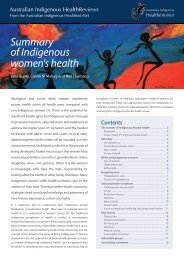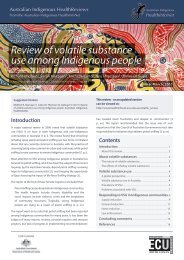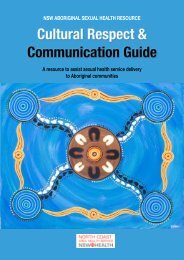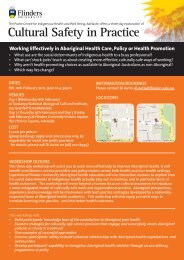hearing loss and the criminal justice system - Australian Indigenous ...
hearing loss and the criminal justice system - Australian Indigenous ...
hearing loss and the criminal justice system - Australian Indigenous ...
You also want an ePaper? Increase the reach of your titles
YUMPU automatically turns print PDFs into web optimized ePapers that Google loves.
2.3 Facilities for <strong>the</strong> Hearing Impaired in JailsNAAJA is also extremely concerned as to <strong>the</strong> inadequate facilities for <strong>the</strong> <strong>hearing</strong>impaired in jails. It is unquestionably <strong>the</strong> case that <strong>the</strong> experience of jail issignificantly more severe on people with <strong>hearing</strong> impairments. Prisons operate with aheavy reliance on prisoners <strong>hearing</strong> comm<strong>and</strong>s, <strong>and</strong> responding as required. Thisincludes <strong>the</strong> use of bells <strong>and</strong> sirens <strong>and</strong> following oral instructions. It is also forcommunication <strong>and</strong> participation, such as being able to engage in discourse witho<strong>the</strong>r prisoners <strong>and</strong> being able to access facilities <strong>and</strong> programs run by <strong>the</strong> prison.The use of amplifiers, <strong>the</strong> installation of <strong>hearing</strong> loops <strong>and</strong> <strong>the</strong> use of interpreters forprograms run by prisons are essential human rights provisions for <strong>the</strong> <strong>hearing</strong>impaired. The failure to provide <strong>the</strong>se facilities increases trauma of <strong>hearing</strong> impairedprisoners, <strong>and</strong> increases alienation for <strong>the</strong> <strong>hearing</strong> impaired in prison.2.4 Defence Counsel <strong>and</strong> Detecting Hearing ImpairmentsDefence counsel play a crucial role in <strong>the</strong> <strong>criminal</strong> <strong>justice</strong> <strong>system</strong> as <strong>the</strong> defendant’s“mouthpiece.” It is <strong>the</strong> case, however, that defendants can only rely on counsel as<strong>the</strong>ir mouthpiece to <strong>the</strong> extent that <strong>the</strong>y are able to clearly <strong>and</strong> effectivelycommunicate with <strong>the</strong>m.It is trite to observe that <strong>the</strong>re are degrees of <strong>hearing</strong> <strong>loss</strong> amongst Aboriginaldefendants, as <strong>the</strong>re are amongst <strong>the</strong> population generally. We are concerned inparticular that partial <strong>hearing</strong> impairment in Aboriginal defendants is sometimesundetected by defence counsel. As noted above, this may be because clients presentwith cultural <strong>and</strong> language barriers that also impact on communications <strong>and</strong> lawyersare simply unaware that a <strong>hearing</strong> impairment is also present. Or it may be becauseAboriginal defendants having suffered <strong>hearing</strong> <strong>loss</strong> for so long, have adapted to <strong>the</strong>ir<strong>hearing</strong> impairment by lip reading or relying on <strong>the</strong> few words that <strong>the</strong>y can partiallyhear.Coupled with this are issues of Aboriginal defendants feeling overwhelmed by <strong>the</strong>prospect of court proceedings. May defendants actually state <strong>the</strong>ir desire to “get <strong>the</strong>ircharges over <strong>and</strong> done with,” irrespective of <strong>the</strong>ir guilt. Some may provideinstructions that <strong>the</strong>y are guilty because <strong>the</strong>y do not want to go through <strong>the</strong> lengthycourt processes associated with having a contested <strong>hearing</strong>. This situation of clientsmay again lead to difficulties for lawyers in detecting <strong>hearing</strong> impairments.More generally, <strong>the</strong> danger of gratuitous concurrence is real <strong>and</strong> present. Lawyersmay think that a client suffering partial <strong>hearing</strong> impairment underst<strong>and</strong>scommunications simply because <strong>the</strong>y respond with a ‘yes’ answer or by nodding <strong>the</strong>irhead. Such responses may in fact mask <strong>hearing</strong> impairment.O<strong>the</strong>r pressures faced by defence counsel at court also inhibit <strong>the</strong>ir ability to detect<strong>hearing</strong> impairments. This may include <strong>the</strong> pressures of having multiple clients to seein a very short space of time, <strong>the</strong> needs of courts to see clients quickly or clients whoare upset or agitated, ‘shamed’ by <strong>the</strong>ir <strong>hearing</strong> impairment or whose communicationdeficit is also influenced by cultural <strong>and</strong>/or language factors.6








